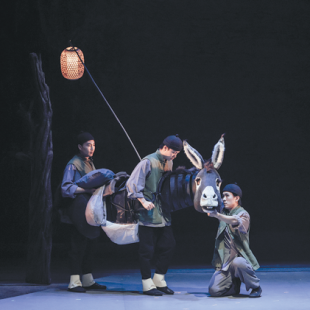New play brings Zheng Banqiao's legacy to the stage


Zheng Banqiao (1693-1766), the renowned Qing Dynasty (1644-1911) magistrate, poet and painter, is celebrated for his exceptional skill in capturing the spirit of bamboo.
Among the great artists of ancient China, Zheng stands out for his ability to imbue his bamboo paintings with profound symbolism. In Chinese culture, bamboo is revered for its strength, resilience and integrity, qualities that mirrored Zheng's own character — unbending in his values and unwavering in his moral resolve.
The new Chinese play, A Branch, A Leaf, A Care — Zheng Banqiao, premiered last Thursday in Beijing, bringing this legendary figure to life onstage. After its debut, the play will tour nationwide, visiting cities such as Weifang and Yantai, both in Shandong province, and Hangzhou, Zhejiang province, showcasing Zheng's legacy to a broader audience.
Directed by He Bing, a veteran actor who also plays the role of Zheng, the play centers on Zheng's seven-year tenure as magistrate of Weixian county, modern-day Weifang. According to He, the production focuses on capturing the essence of Zheng's approach to governance — his attention to the smallest details of the people's lives and his profound respect for their welfare.
"Zheng's rule was marked by acts of kindness, such as opening granaries to relieve disaster victims, donating his salary to alleviate hardship, and punishing corruption," He says. "We wanted to reflect not only his moral integrity but also his artistic achievements — his calligraphy, poetry and paintings. All of these aspects are woven into the play to offer a holistic view of his legacy."
Zheng's art, particularly his bamboo paintings, serves as a direct reflection of his strong moral character. Known for his "wild and free "style, Zheng's bamboo art was more than just an aesthetic choice; it was a powerful symbol of his own resilience. The bamboo in his paintings, standing tall and unwavering despite adversity, echoed his own moral fortitude.

"Bamboo represents strength and integrity," says He. "It bends in the wind but never breaks, much like Zheng himself."
In addition to his paintings, Zheng's poetry mirrors his sense of duty and clarity of purpose. His famous lines, such as, "In the magistrate's study, I hear the rustling bamboo. I wonder if it is the sound of the people's distress", reflect his deep empathy for the suffering of the common people and his commitment to serving them with righteousness.
The director also notes that in 1753, at the age of 60, Zheng made a pivotal decision to leave behind his life as a magistrate to dedicate himself solely to painting, poetry and a close-knit group of like-minded friends known as the "Eight Eccentrics of Yangzhou". Yangzhou, an affluent city in East China's Jiangsu province, was a cultural hub for scholars, painters and calligraphers — a place where Zheng would fully embrace his artistic and intellectual passions.
Zheng's decision to leave his position in the government was both voluntary and inevitable. Voluntary because he had sealed his own fate by openly disobeying his superior — refusing to close the county granary to starving villagers during a time of great famine. In doing so, he rejected the corruption and moral compromise that were often associated with imperial bureaucracy.
In terms of stage design, A Branch, A Leaf, A Care — Zheng Banqiao draws inspiration from the aesthetics of poetry and painting, incorporating symbolic "donkey puppets" as a creative performance tool.
"Legend says that when Zheng Banqiao left Weifang, he moved his belongings by using only three small donkeys. One donkey was ridden by a servant who led the way, another carried two bundles of books and a musical instrument, and the third carried his simple luggage, which he rode himself. His departure, marked by simplicity and humility, serves as an inspiring element for this play," says He.
"The production is not just about bringing a historical figure to life onstage," says Yao Rui, general manager of the Beijing Poly Theatre Management Co, which coproduced the play. "It's a call to revisit values that transcend time and resonate deeply with today's society. The play provides a lens through which we can reflect on the moral lessons of the past and apply them to the present."
chennan@chinadaily.com.cn





































